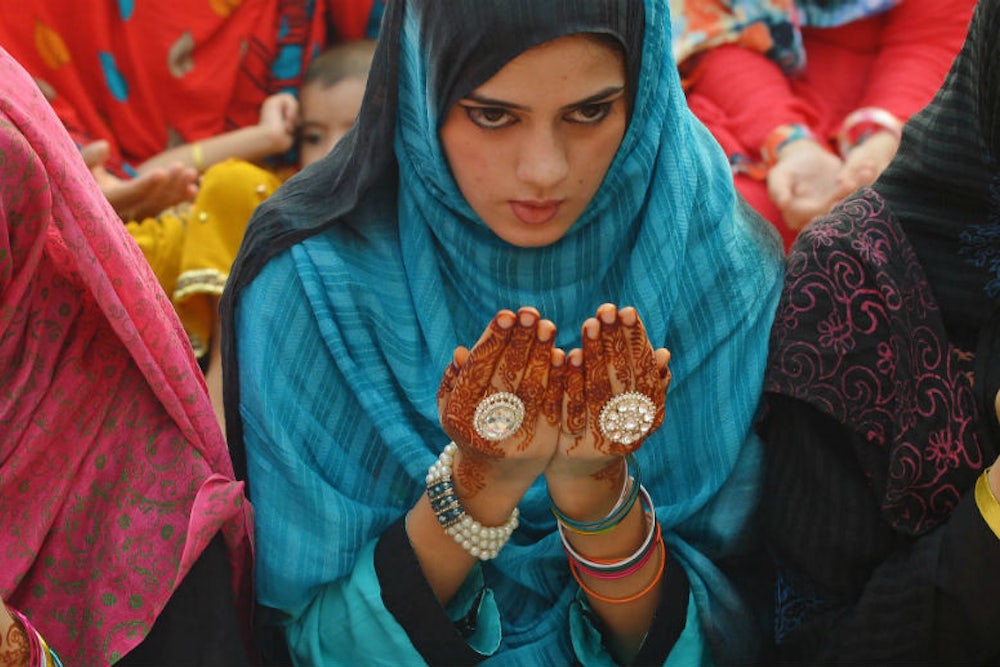The bearded clerics of Pakistan’s Council of Islamic Ideology, the advisory body that determines whether the country’s laws are in accordance with Islam, have been extremely busy this year. Central to their preoccupations has been the issue of marriage; in March they ruled that existing legislation requiring a man to obtain written permission from existing wives before marrying another were un-Islamic and needed to be amended. Then in May they announced that laws prohibiting the marriage of minors were also un-Islamic. Puberty, not age, determines eligibility for marriage, said Maulana Muhammad Khan Sheerani, the Chairman of the Council, clarifying that legal contracts for marriage could be completed by guardians for minors, while consummation could wait until after puberty.
On Tuesday, after the Council's latest conclave, came another bombshell. Polygamy, said Sheerani, could not be a condition for which a woman could petition for divorce. The sum of all the Council’s rulings, if legislated, would mean that a Pakistani man could marry a second, third, or fourth wife without the permission of existing ones, who could not petition for divorce for this reason. If the pronouncements regarding child marriage are added to the mix, these subsequent wives could be as young as twelve or 13 years old.
None of these proposed amendments have not yet been taken up by the National Assembly of Pakistan, a step necessary for enactment. However, the pronouncements of the Council usually pave the way for legislative amendments. The slogan of bringing the country in line with Islam has legitimized many a military dictator and unpopular prime minister. Taking up the proverbial mantle of purifying marriage laws by eliminating all possibilities of women making choices or exercising rights could indeed rescue the currently beleaguered Prime Minister Nawaz Sharif, rendering him a religiously anointed hero.
However, to imagine the battle lines over marriage in Pakistan to be clearly drawn between Islamist clerics who insist on archaic and misogynistic interpretations of religion and their liberal opponents would be a mistake and would ignore that even the most liberal of Pakistani men are products, and at least passive fans of, their patriarchal society and its polygamous permissions.
The story of the genesis of the Muslim Family Laws Ordinance, Pakistan’s first marriage legislation, is instructive in this regard. It begins, ironically, in the United States not long after Pakistan’s birth in 1947. Pakistan’s urbane and charismatic ambassador to the United Nations, Mohammad Ali Bogra, fell for his social secretary, Aliya Saadi. The besotted Bogra was married, but it soon dawned on him that now that the Islamic Republic of Pakistan existed, marrying more than one woman was not a problem. In an interview to an American newspaper, he suggested that polygamy was an antidote to the Western custom of divorce.
On April 2, 1955, now Prime Minister Bogra married again, without the permission of his first wife. The now deposed and furious first Mrs. Bogra would not accept her fate in silence. She allied with the wives of Pakistan’s elite dignitaries, educated and highly connected ladies who lunched, inaugurated schools, and did token acts of empowerment for Pakistan’s poor women. Together, the women mounted a political attack, boycotting official functions attended by the new Mrs. Bogra and campaigning for legislation that would ban polygamy. The ban failed, but soon Bogra was no longer prime minister. A military man, General Ayub Khan, took the helm via imposition of military rule. His daughter Naseem was part of the campaign and one of the first things the general did was pass the Muslim Family Laws Ordinance of 1961. Democracy may have lost but women had won, at least partially. The new legislation didn’t outlaw polygamy but it did require written permission of the first wife, imposed a minimum marriage age of 18, and provided conditions under which men, not just women, could petition for divorce. Polygamy remained legal in Pakistan, even though several interpretations of the Holy Quran allow interpretive room for a ban. Years and two terms of a female prime minister passed, but no more efforts were made to ban polygamy.
In contemporary Pakistan, polygamy is being revived as the marital expression of the authentically Islamic society that Pakistan so aches to be, touted as a solution to the problem of destitute women, the prevalence of adultery, a man’s greater need for sex, and myriad other problems. Abandoned first wives and neglected children have no legal mechanism for sustenance or support. With the extremist groups like the now Islamic State–allied Tehreek-e-Taliban Pakistan gaining ground in Pakistan, many politicians, liberal or otherwise, see imposing the Council’s recommendations as convenient political ploys to negotiate the post-Taliban peace that everyone wants. After all, if one of their wives complains, they can always get another.
